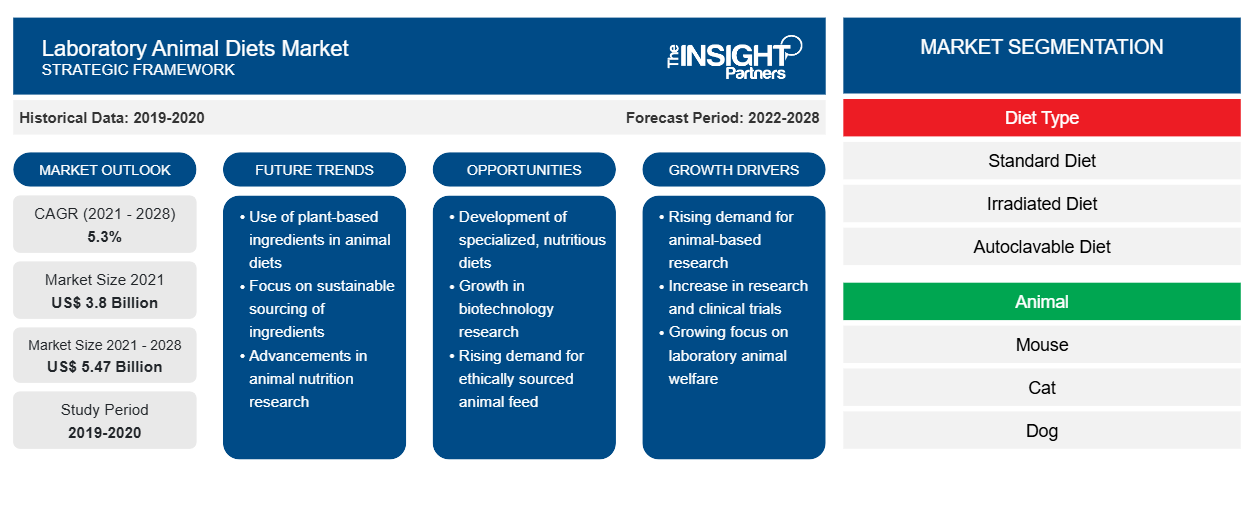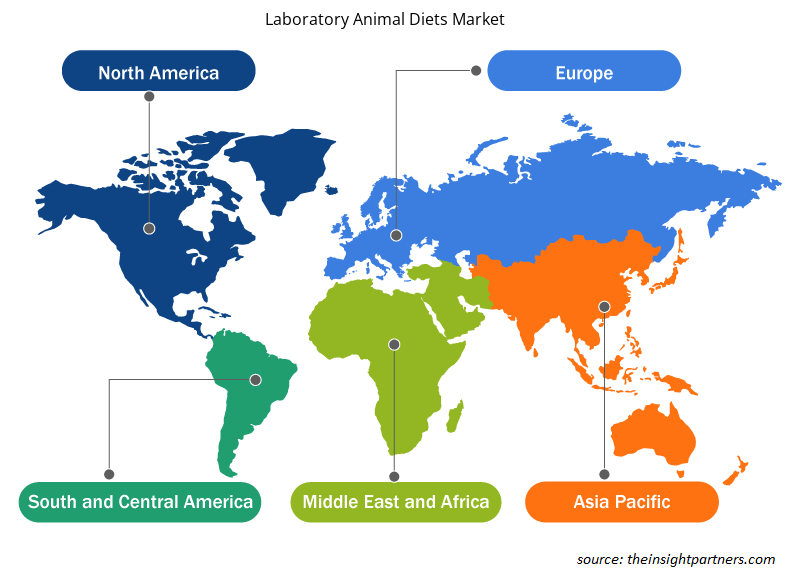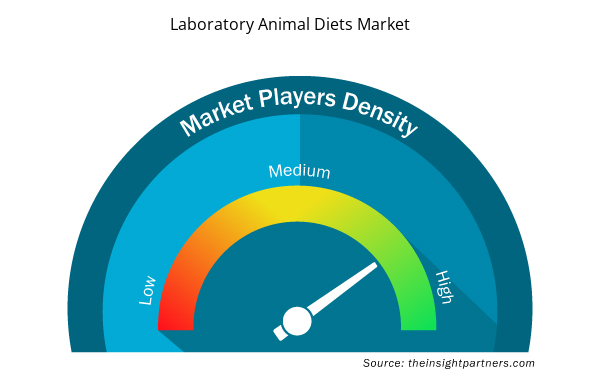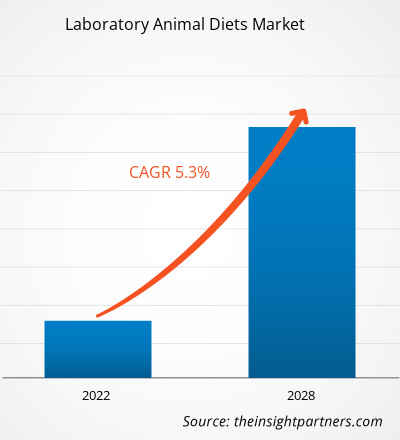The laboratory animal diets market is expected to grow from US$ 3,797.50 million in 2021 to US$ 5,469.24 million by 2028; it is estimated to grow at a CAGR of 5.3% from 2022 to 2028.
Growing consumption of personalized medicines is one of the major factors driving the laboratory animal diets market growth. However, the high cost of laboratory animal diet restrains the growth of the overall market growth.
According to the Food and Drug Administration (FDA), personalized medicine aims to increase benefits and reduce patient risks by targeting prevention and treatment more effectively. The practical application of personalized medicine depends heavily on the availability of rigorous diagnostic tools that allow the optimal selection of therapeutic products to improve patient outcomes.
Personalized medicines are treatments based on the environment, the patient's unique biological makeup, and lifestyle. Companies are focused on introducing new companion diagnostics for various types of cancer. For example, in October 2020, Roche received the US FDA approval for the expanded claims of the Cobas EGFR Mutation Test v2 as (CDx) for treating non-small cell lung cancer (NSCLC). Therefore, the FDA approval of such a new and innovative approach may pave the way for patient identification for personalized medicine.
Customize This Report To Suit Your Requirement
You will get customization on any report - free of charge - including parts of this report, or country-level analysis, Excel Data pack, as well as avail great offers and discounts for start-ups & universities
Laboratory Animal Diets Market: Strategic Insights

- Get Top Key Market Trends of this report.This FREE sample will include data analysis, ranging from market trends to estimates and forecasts.
Customize This Report To Suit Your Requirement
You will get customization on any report - free of charge - including parts of this report, or country-level analysis, Excel Data pack, as well as avail great offers and discounts for start-ups & universities
Laboratory Animal Diets Market: Strategic Insights

- Get Top Key Market Trends of this report.This FREE sample will include data analysis, ranging from market trends to estimates and forecasts.
Personalized medicines are concepts, practices, or modalities that expressly predict the human response to medicines and diseases based on intraspecific differences. Slight differences in genetic makeup can result in dramatic differences in response to drugs or disease. Researchers help in developing approaches to personalized medicines for many genetic disorders. These personalized medicines sometimes use custom genetic interventions, such as antisense-mediated exon skipping or genome editing, to restore protein function in a mutation-specific manner. In drug discovery and development, mice models have played an essential role by characterizing disease pathophysiology and associated injury mechanisms; identifying drug targets; and evaluating novel therapeutics for toxicity/safety, pharmacokinetics, pharmacodynamics, and efficacy. The selection of a specific model for the testing and development of a particular drug depends on the goal of the thorough study.
The traditional use of animal models in drug discovery establishes and demonstrates nonclinical proof of concept for specific drug molecules' safety, efficacy, and target of interest. Animal models can facilitate the development of personalized medicine approaches. Personalized medicine approaches need to be developed and preclinically tested in relevant cell and mouse models containing the human target sequences. The animal models used for personalized medicine research and drug discovery & development are provided with specific diets so that the animal model will react according to the human environment. Therefore, rising demand for personalized medicines is expected to fuel the growth of the laboratory animal diets market during 2022–2028.
Regional Overview
China holds a considerable share in the Asia Pacific laboratory animal diets market. China has access to huge colonies of monkeys and other species. Thus, scientists in the country face less public inspection as compare to Europe and the US. China has become the center of the CRISPR animal kingdom, which is appealing to the researchers. Also, the Chinese government has massive investments in new services and determined research projects. Animal research in the country is regulated and administratively managed according to national and provincial laws, regulations, guidelines, and standards. Laboratory animal science in China has developed rapidly over the past 30 years due to governmental and societal forces, which is encouraging the research projects in the country. According to Institute of Laboratory Animal Sciences (ILAS), China uses roughly 20 million animals, such as mice, dogs, rabbits, and nonhuman primates, in research each year. Thus, increasing biomedical research utilizing laboratory animals is expected to drive the laboratory animal diets market during the forecast period.
Diet Type Insights
Based on diet type, the laboratory animal diets market is segmented into standard diet, irradiated diet, and autoclavable diet. The standard diet segment held the largest share of the market in 2021. The standard diet is formulated to meet broad objectives at all life stages involved in feeding laboratory animals i.e., the nutrients that are in general needed for lab animals are already present in the standard diet. For example, the LabDiet canine diet meets the nutritional requirements of all canine species utilized in a laboratory and supports all life stages, such as growth, maintenance, gestation, and lactation. Further, the University of Alabama at Birmingham published a report in 2022 stating that maintaining animal health is critical intended for research purposes, with good nutrition as a key component of health. Standard diets comprising known ingredients are available for rodents. However, nutritionally complete (or replete) diets are not commercially available for some laboratory species. Therefore, top companies are developing standard animal feeding. For example, Envigo's standard diet comprises relatively undefined agricultural commodities such as grains, grain by-products, concentrated plant protein sources, animal proteins, vitamins, minerals, and fats. Thus, the aforementioned factors are responsible for accelerating the adoption of standard diet, ultimately driving the overall laboratory animal diets market growth.
Companies operating in the laboratory animal diets market adopt the product innovation strategy to meet the evolving customer demands across the world, which also permits them to maintain their brand name in the market.
Laboratory Animal Diets Market Regional Insights
Laboratory Animal Diets Market Regional Insights
The regional trends and factors influencing the Laboratory Animal Diets Market throughout the forecast period have been thoroughly explained by the analysts at Insight Partners. This section also discusses Laboratory Animal Diets Market segments and geography across North America, Europe, Asia Pacific, Middle East and Africa, and South and Central America.

- Get the Regional Specific Data for Laboratory Animal Diets Market
Laboratory Animal Diets Market Report Scope
| Report Attribute | Details |
|---|---|
| Market size in 2021 | US$ 3.8 Billion |
| Market Size by 2028 | US$ 5.47 Billion |
| Global CAGR (2021 - 2028) | 5.3% |
| Historical Data | 2019-2020 |
| Forecast period | 2022-2028 |
| Segments Covered |
By Diet Type
|
| Regions and Countries Covered | North America
|
| Market leaders and key company profiles |
Laboratory Animal Diets Market Players Density: Understanding Its Impact on Business Dynamics
The Laboratory Animal Diets Market market is growing rapidly, driven by increasing end-user demand due to factors such as evolving consumer preferences, technological advancements, and greater awareness of the product's benefits. As demand rises, businesses are expanding their offerings, innovating to meet consumer needs, and capitalizing on emerging trends, which further fuels market growth.
Market players density refers to the distribution of firms or companies operating within a particular market or industry. It indicates how many competitors (market players) are present in a given market space relative to its size or total market value.
Major Companies operating in the Laboratory Animal Diets Market are:
- Envigo
- Altromin Spezialfutter GmbH & Co. KG
- LabDiet
- SAFE
- Dyets, Inc.
Disclaimer: The companies listed above are not ranked in any particular order.

- Get the Laboratory Animal Diets Market top key players overview
Laboratory Animal Diets Market – Segmentation
- Based on animal, the laboratory animal diets market is segmented into mouse, cat, dog, rabbit, chicken, and others. The mouse segment held the largest share of the market in 2021 and is anticipated to register the highest CAGR during the forecast period.
- Based on application, the laboratory animal diets market is segmented into drug discovery & personalized medicine, regenerative medicine, pathology of infectious diseases, drug toxicity & efficacy testing, and others. The drug discovery & personalized medicine segment held the largest share of the market in 2021. However, the pathology of infectious diseases segment is anticipated to register the highest CAGR during the forecast period.
- Based on end user, the laboratory animal diets market is segmented into pharmaceutical & biopharmaceutical companies, research & academic institutes, and others. The pharmaceutical & biopharmaceutical companies segment held the largest share of the market in 2021. However, the research & academic institutes segment is anticipated to register the highest CAGR during the forecast period.
- Based on geography, the laboratory animal diets market is segmented into North America (the US, Canada, and Mexico), Europe (the UK, Germany, France, Italy, Spain, and the Rest of Europe), Asia Pacific (China, Japan, India, Australia, South Korea, and the Rest of Asia Pacific), the Middle East & Africa (the UAE, Saudi Arabia, South Africa, and the Rest of the Middle East & Africa), and South & Central America (Brazil, Argentina, and the Rest of South & Central America).
Envigo; Altromin Spezialfutter GmbH & Co. KG; LabDiet; SAFE; Dyets, Inc.; Special Diet Services; Specialty Feeds; Research Diet Inc.; Bio-Serv; and Krishna Valley Agrotech LLP. Are among the key companies operating in the laboratory animal diets market.
- Historical Analysis (2 Years), Base Year, Forecast (7 Years) with CAGR
- PEST and SWOT Analysis
- Market Size Value / Volume - Global, Regional, Country
- Industry and Competitive Landscape
- Excel Dataset


- Data Center Cooling Market
- Embolization Devices Market
- Maritime Analytics Market
- Micro-Surgical Robot Market
- Lyophilization Services for Biopharmaceuticals Market
- Predictive Maintenance Market
- Non-Emergency Medical Transportation Market
- USB Device Market
- Terahertz Technology Market
- Malaria Treatment Market

Report Coverage
Revenue forecast, Company Analysis, Industry landscape, Growth factors, and Trends

Segment Covered
Diet Type, Animal, Application, and End User

Regional Scope
North America, Europe, Asia Pacific, Middle East & Africa, South & Central America

Country Scope
Argentina, Australia, Brazil, Canada, China, France, Germany, India, Italy, Japan, Mexico, Saudi Arabia, South Africa, South Korea, Spain, United Arab Emirates, United Kingdom, United States
Frequently Asked Questions
Growing consumption of personalized medicines and rising usage of mice models in virology & infectious disease are the most significant factors responsible for the overall market growth.
Based on diet type, the standard diets segment took the forefront leaders in the worldwide market by accounting largest share in 2021. However, irradiated diets segment is expected to witness the highest CAGR during the forecast period.
Laboratory animal diet is the science of feed preparation and feeding and is recognized as an important variable. Poor feeding decreases productivity of the animal as feed is financially the single most important element of animal production irrespective of species and production system. For example, feed cost accounts for up to 70% of the total cost of production of an animal product.
The pharmaceutical & biopharmaceutical companies segment dominated the global laboratory animal diets market and accounted for the largest market share of 58.8% in 2021.
Based on the animal, mouse segment took the forefront leaders in the worldwide market by accounting largest share in 2021 and the same segment accounts for maximum CAGR during the forecast period of 2022-2028.
Envigo, Altromin Spezialfutter GmbH & Co. KG, LabDiet, SAFE, Dyets, Inc., Special Diet Services, Specialty Feeds, Research Diets Inc., Bio-Serv, Krishna Valley Agrotech LLP are among the leading companies operating in the laboratory animal diets market.
Global laboratory animal diets market is segmented by region into North America, Europe, Asia Pacific, the Middle East & Africa, and South & Central America. In North America, the U.S. held the largest market share in 2021.
Trends and growth analysis reports related to Life Sciences : READ MORE..
The List of Companies - Laboratory Animal Diets Market
- Envigo
- Altromin Spezialfutter GmbH & Co. KG
- LabDiet
- SAFE
- Dyets, Inc.
- Special Diet Services
- Specialty Feeds
- Research Diets Inc.
- Bio-Serv
- Krishna Valley Agrotech LLP

 Get Free Sample For
Get Free Sample For